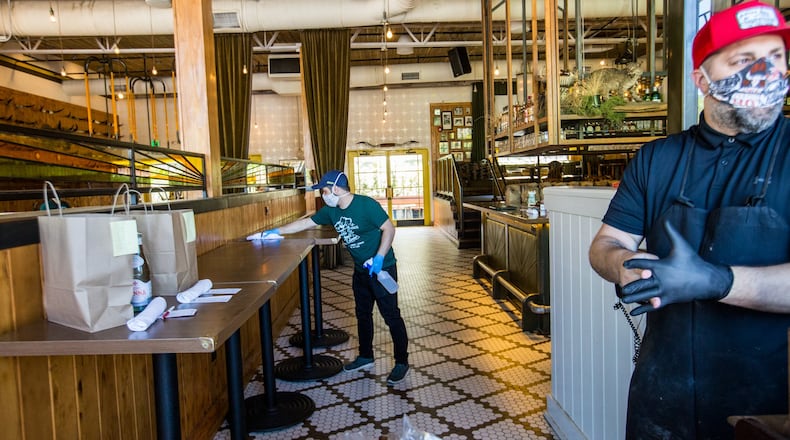It started in 2007 with a single restaurant: JCT Kitchen. In 13 years, with Ford Fry as its face, the trend-setting Rocket Farm Restaurants group opened 17 dining spots, a dozen in Atlanta alone.
Then COVID-19 arrived. On March 26, Fry threw in the towel, closing all his restaurants temporarily and idling nearly 1,400 employees.
The lights are off everywhere now. No one is enjoying romantic dinners at St. Cecilia. There’s no Tex-Mex for breakfast at Little Rey, no power lunches at King and Duke in Buckhead, no margaritas and guac for happy hour at Superica or late-night noshing at Marcel. The group’s lauded pastry chef Chrysta Poulos isn’t in the commissary kitchen placing orders for sugar, butter and flour. The scene is somber even at the group’s corporate office as everyone packs up to work from home.
About 20 miles away, organic farmer Ashley Rodgers has maxed out four credit cards to go with the mortgage on her 64-acre farm near Campbellton. Her monthly debt-service payments now total about $8,000, and Fry no longer needs her root vegetables or lettuces.
As restaurants shutter amid the coronavirus pandemic, it’s not just their owners and staff struggling to stay afloat. The ripple effects are slamming a vast local supply chain. Farmers. Beer and wine distributors. Janitors. Grease-trap cleaners. Florists. Makers of curated wood for kitchen hearths.
Like Stefan Van Sant, who’s seen monthly revenue at his Dunwoody-based Uptown Cleaning Services dry up from about $167,000 to $4,000 as restaurant clients scaled back to takeout only or closed completely — first Fry’s Rocket Farm group, then Fellini’s Pizza and, most recently, Rumi’s Kitchen.
Perhaps no local industry has been hit harder by the coronavirus than restaurants and bars, after authorities across much of metro Atlanta banned in-dining and closed watering holes. About 300,000 people worked in area eateries and the state’s restaurants were on pace to generate about $25 billion in revenue this year before traffic collapsed, according to the Georgia Restaurant Association.
Virtually every dining segment has shrunk, from fast-casual chains to individual restaurant owners to groups like Rocket Farm, whose expanse includes properties in every city hot spot from the Beltline to the Battery. Small independent restaurants are especially vulnerable because they lack deep financial resources, and many might not reopen despite a $2.2 trillion federal emergency package earmarking hundreds of millions of dollars for small businesses.
Fry’s Rocket Farm says it has the financial resources to weather the crisis. But it won’t be paying armies of suppliers for goods and services it is no longer ordering. The restaurant group has 2,417 vendors, most of them in and around Atlanta. The Alpharetta location of Superica, the busiest among the group’s restaurants, served about 4,400 customers in a typical week before pausing operations.
About 210 businesses supply the group with food, including Rodgers and Celia Barss, another organic farmer outside Athens.
There’s little Rocket Farm can do while its restaurants’ doors are closed, said Toby Franklin, the group’s chief operating officer, even as he acknowledged the dire financial straits of many vendors.
“We work with a lot of local farmers and they can’t afford to not get paid,” Franklin said in an interview.
Unpaid leave for employees; supplier orders dry up
Fry, a Houston native, is an Atlanta dining giant. His Rocket Farm rapidly expanded to become one of the city’s biggest players, opening six restaurants between 2014 and 2015 alone, and winning accolades along the way.
“Fry’s empire is starting to resemble something like that of King Midas,” wrote former AJC dining critic Wyatt Williams in a 2015 review of Fry’s Bar Margot. “Is there anything he touches that doesn’t turn to gold?”
When Rocket Farm first scaled back operations in March to carry-out service at a few locations, it placed about 1,240 workers on protected, unpaid leave. That status allowed workers to apply for unemployment benefits but also receive health care benefits, a move that many restaurant owners cannot afford. On March 27, Rocket Farm closed all restaurants through at least mid-April, placing almost its entire 1,390-person staff in the same category.
The shutdown means Landon Waters is no longer waiting tables at St. Cecilia like he has for the past three years. He thinks he can hold out for at least two months before he’ll be forced to find another job. But he considers himself lucky.
“Those of us who had medical coverage will continue to have it at this time, and they filed for unemployment benefits on our behalf,” he said. “It’s not something they had to do. One thing they always said: They serve those who serve the guests.”
About a third of Rocket Farm’s employees are servers like Waters. A quarter are cooks, about a tenth are managers and the rest are bartenders, stewards, hosts and servers’ assistants.
The fallout doesn’t end with the employees.
Rodgers, the cash-strapped organic farmer, sells everything from garlic to bok choy to watermelon radishes. They are grown at her Douglas County farm to Rocket Farm and other pricey farm-to-table restaurants like Bacchanalia, Redbird and AIX. They make up 40% of her sales.
“I am still a young business,” she said. “All my loans are tied to my property. It gets really risky for me. I can’t pay the $8,000 a month I have in debt.”
Rodgers planned how many crops to grow and when to plant based on projected demand from her regular customers. Now those plans have gone awry.
“I fronted my spring crops on credit card debt knowing I could pay those off by harvesting,” she said. “If May comes and I lose 40% of my business, where is my produce going?”
Mike Coghlan, owner of Duluth-based wine distributor Avant Partir, is making similar calculations about his inventory.
Many of the wines Coghlan supplies to Rocket Farm are difficult to obtain, like Clos Alzina, a carignan wine from Spain, and a Sicilian red wine called Njuro. Coghlan’s sales are down from restaurants closing, but he can’t indefinitely postpone some purchases. He knows that Fry’s restaurants will want to offer their full complement of wines when they swing their doors open again.
“The best thing for our business is to have enough wine on hand so we can respond as quickly as possible when everything reopens,” he said. “We don’t want to be waiting two weeks to get wine from our importers.”
Credit: Jenni Girtman
Credit: Jenni Girtman
Businesses with perishable food on their hands are in a different predicament, rushing to find buyers.
Atlanta-based Inland Seafood supplies fish, seafood and other proteins to Rocket Farm. For the first time in the company’s 43-year history, it began direct online sales to consumers in March.
“We’re all learning as we go about how everybody is going to survive this, not just from a health standpoint, but a health economic standpoint,” said Bill Demmond, Inland Seafood’s chief operating officer.
There also are barrels upon barrels of beer sitting in tanks, waiting to be tapped, with no place to go. Liberator Distributing in Tucker would normally be selling brews like Burial Beer’s Surf Wax IPA to the Optimist, said Jason Wiles, who established the company in 2015. The Fry restaurant’s closing means not only that he’s lost sales, but so have brewers and their suppliers.
“It means it affects the hop growers and the malt producers,” who sell ingredients to brewers, Wiles said. “It trickles all the way down the line.”
Commercial cleaning companies have to stop buying supplies, too. Van Sant, owner of Uptown, said his business is about 95% shut down. Clients like Fry’s Rocket Farm have stopped cleaning their spaces. Van Sant has canceled deliveries of floor degreasers, disinfectants and mop heads and told his 50 employees to find other work, if they can.
“I would love to keep my employees on, if I could have something for them to do,” Van Sant said. “But restaurants aren’t going to be paying me, even for work we’ve already done for them. They don’t have the money on hand.”
The shutdown has put the kibosh on some suppliers’ expansion plans. Justin Farah, owner of Pristine Hood Vent Services in Dallas, was planning to buy a new building to accommodate his company’s earlier growth. Rocket Farm restaurants that use wood-burning grills must have their hood vents cleaned monthly.
Instead, Farah is scrambling to keep his business running. He will likely cancel two daily routes, which each services about 50 restaurants. Those routes are typically manned by two workers, but he may add more to each route. That will reduce their individual pay, but at least they will keep getting a paycheck.
He wants to avoid being stuck without a workforce when business returns to normal. Hood vent cleaning specialists must receive special training and they’ll be hard to replace.
“You’ve got to be certified to clean these vents,” he said. “The restaurants have to hire us because they can’t do it themselves.”
(Financial) Help Wanted
Federal emergency loan programs aim to keep hard-hit businesses afloat in the coming weeks and months, although it’s too early to know how many will survive. The federal government’s stimulus program also expands unemployment benefits and provides a tax credit to businesses that keep employees on staff, even if they’ve closed or drastically curtailed operations.
“My guess is that we’re going to be forced to try to take advantage of some of these government relief packages,” said Wiles, of Liberator Distributing.
As for the restaurants themselves, some might be able to file claims if they carry business-interruption insurance. Some of those policies may contain provisions that cover “acts of God,” which could be used for coronavirus-related claims, said Brian Smith, an attorney at Arnall Golden Gregory who represents restaurants in lease negotiations.
Small, independently owned and only recently opened restaurants likely face the biggest challenges.
After years of operating pop-up concept Eat Me Speak Me, chef Jarrett Stieber's dream of opening a brick-and-mortar restaurant finally came true this year when he unlocked doors to Little Bear in Atlanta's Summerhill neighborhood. The 30-seat restaurant was open a mere two weeks before a state of emergency was declared.
“It’s not an ideal way to start a business,” said Stieber, who pivoted to offer a carryout version of Little Bear’s tasting menu.
Although cash is coming in, it’s less than his full-service plan. “The frustrating part is, all your bills don’t stop.”
The financial pressure hasn’t stopped for Fry’s Rocket Farm, either. Despite its prominence in the Atlanta dining scene, the company is generating no revenue at the moment, which likely will be the case through at least the first half of April.
“We’re not out of money, but we’re running critically in the negative,” said Franklin, the restaurant group’s COO.
He said the company hopes the federal stimulus plan provides a financial bridge to the other side. Rocket Farm also is working with its private-equity owners, whom it declined to identify, and its lenders at Truist. A Truist spokesman said the bank is “actively working on a case-by-case basis to support the needs of our retail and business clients who are affected by COVID-19 pandemic.”
Meanwhile, Rodgers, the organic farmer, plans to plow on for now despite her maxed-out credit cards. She’s selling whatever online grocer Fresh Market will buy from her and started a market at her farm.
“It might be the safe call to pull back on my planting. I don’t think it is the moral call. I’m proceeding as normal. I hope if I grow it, I can find a place they can buy it,” said Rodgers.
Keep Reading
The Latest
Featured












